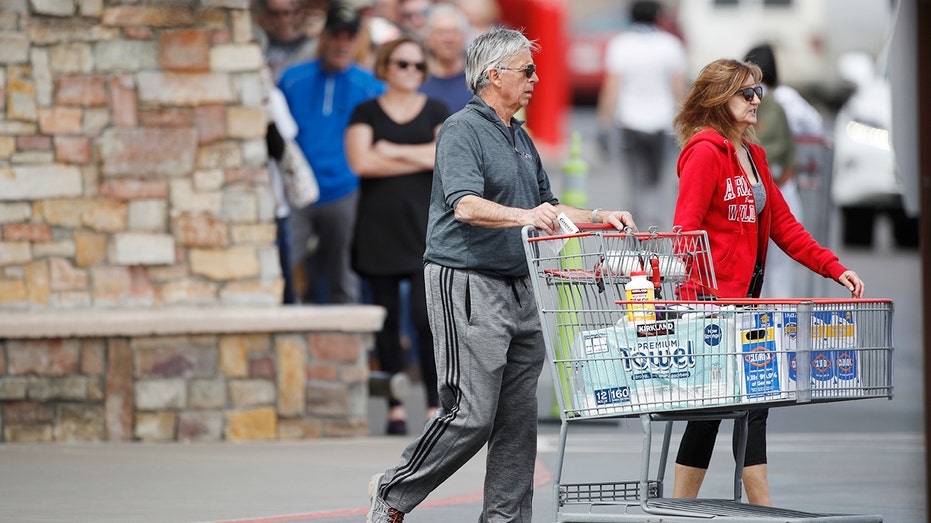To curb coronavirus spread, some Walmart, Target, Costco stores directed to stop selling 'non-essential' items
Shoppers are encouraged to order nonessential items online or use curbside pickup
Get all the latest news on coronavirus and more delivered daily to your inbox. Sign up here.
Some of the country's biggest retailers are being asked to stop selling "non-essential" items in stores during the coronavirus pandemic.
Governments on state and local levels in Vermont, Michigan and Colorado are among those that have called upon stores, including Target, Walmart and Costco, to offer only "essential items" in an effort to reduce foot traffic. Instead, officials are encouraging these stores to have customers order items deemed "non-essential" online or over the phone for delivery or curbside pickup.
Many of these businesses have been designated to remain open so the public can continue to buy critically needed supplies such as groceries and medicine. However, as the outbreak continues to spread, government officials and businesses are increasingly finding ways to reduce the number of people that enter a store at a time in order to effectively follow proper social distancing protocols.
EARLY STUDY SHOWS CORONAVIRUS TRAVELING FARTHER THAN SOCIAL-DISTANCING RULES RECOGNIZE
The move comes after Dr. Deborah Birx, the White House coronavirus response coordinator, told reporters last month that new data shows the administration’s social distancing guidelines were not being followed to the extent necessary to keep virus-related deaths to a minimum.

Shoppers wheel out a cart with hand towels and bleach as they head to their vehicle outside a Costco warehouse on April 1, 2020, in Lone Tree, Colo. (AP Photo/David Zalubowski)
Less than two weeks ago, Vermont's Agency of Commerce and Community Development directed large retailers, such as Walmart, Target and Costco, to cease the sale of items including, but not limited to, arts and crafts, clothing, electronics, furniture and sports equipment.
"Large ‘big box’ retailers generate significant shopping traffic by virtue of their size and the variety of goods offered in a single location,” said Vermont Commerce Secretary Lindsay Kurrle. "This volume of shopping traffic significantly increases the risk of further spread of this dangerous virus to Vermonters and the viability of Vermont’s health care system."
CORONAVIRUS IMPACT: STATE-BY-STATE RESTRICTIONS
Instead, the agency is asking these stores to require shoppers to order non-essential items online or over the phone for delivery or curbside pickup.
Similar measures were enacted within Michigan and Summit County, Colorado.
On April 9, Michigan Gov. Gretchen Whitmer signed an executive order imposing "more stringent limitations on stores to reduce foot traffic." At the direction of the governor, "large stores" must close areas dedicated to carpeting, flooring, furniture, garden centers, plant nurseries or paint.
"Michigan has the third-highest number of COVID-19 cases in the country, and we’re still on the upswing. We must continue to do everything we can to slow the spread and protect our families,” Whitmer said when signing the order.
Summit County issued a similar policy to prevent the spread of the virus, according to an addendum written by the county health department.
"In order to discourage public gatherings and overcrowding, establishments meeting the definition of grocery, pharmacy, pet food store, or hardware store may sell only those items included in those categories; i.e. stores shall cordon off and not allow sales of items other than pharmaceuticals, groceries including essential goods and services such as cleaning products, pet food and supplies, or hardware," Summit County Public Health Director Amy Wineland wrote.
The order further states that retailers may continue to provide these goods online or over the phone provided that they are delivered to a customer's home, or for curbside pickup.
Walmart, Target and Costco did not immediately respond to FOX Business request for comment.
To date, more than 1.8 million people around the world have been infected with COVID-19 and over 117,000 people have died, according to data by Johns Hopkins University.
CLICK HERE TO READ MORE ON FOX BUSINESS
The Associated Press contributed to this report.





















